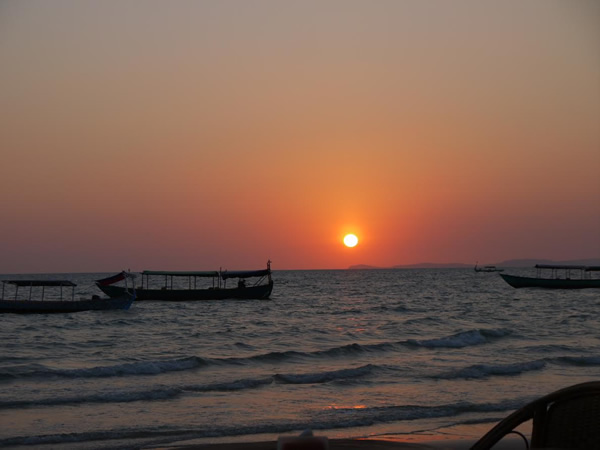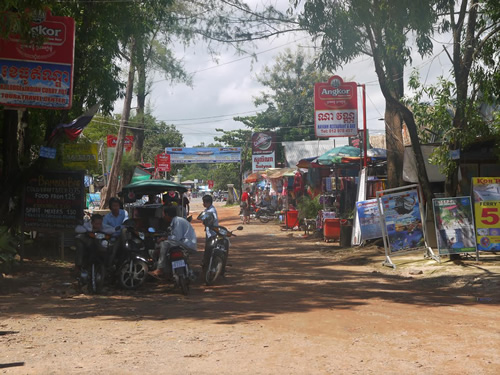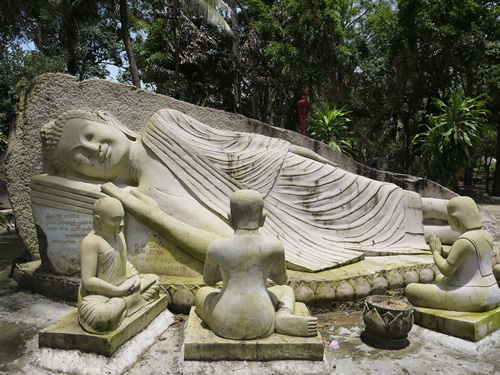An Expat’s Budget in Beach Town Cambodia
Article and photos by Brett Dvoretz
 |
| Fishing boats at sunset near my home in Cambodia. |
Riding my motorcycle home from lunch on the beach, I grab a little snack of some fried bananas and a refreshingly cool coconut to top off the meal. While waiting for the little old Cambodian woman to fearlessly hack off the end of the coconut with a giant machete, with little regard for her hand, I think back for a moment about how my life has changed over the past few years.
Just two years ago, I was running a catering company and regularly working 13 or 14-hour days to make ends meet. Bills were high and there was seldom money left over at the end for any savings or enjoyment. Finally, I had enough. It was time to quit the rat race.
About a year ago, I moved to a little beach town named Sihanoukville on the southern coast of Cambodia. It’s hard to imagine a better place to be living. There are seven beaches within 15 minutes of my apartment. Access is available to all the modern amenities you might need without the stifling development that crushes the souls of most beach towns. And there are some of the most beautiful sunsets in the world.
Some people think it’s hectic. Motos are zooming to and fro with seemingly little regard for any kind of traffic laws. Locals seen always to be out on the street engaged in some kind of social activity. But those and other traits just make living here all the more inviting. The people have a playful nature. It is common to see 30- or 40-year-olds joking and playing around like teenagers. Shy at first, many locals are quick to open up once they feel more familiar with you. I am constantly being invited to join my Khmer neighbors for a drink or a quick snack.
In the tourist areas most of the Cambodians speak English, but it’s still a good idea to try and learn some of the Khmer language. Once you are in the side streets interacting with older people or others not often exposed to tourists, communication can rapidly break down.
 |
| Tuk tuk and moto drivers waiting for clients. |
Among the many of the other appeals of living in Cambodia, and one of its biggest draws, was the low cost of living. The constant budgeting required when living in America became tiresome and stressful. It seemed like money was always going out the door faster than it was coming in. There was no time for a meaningful life. It was all work and no fun. The culture of "living to work" prevailed. In Cambodia, with relatively little work, I can afford to eat, buy, and engage in all the activities I desire.
 |
| Buddhist statues at Wat Lue; a hilltop temple in Sihanoukville. |
So what about living here in Sihanoukville? What does it actually cost to live a comfortable life in beach town Cambodia?
Rent
Rent starts out cheap enough. You can find a studio for as low as $100 a month or pay over $1000 for a huge villa. An apartment with one or more bedrooms will range from $200 to $500 depending on the layout and the location. Houses start as low as $250, but expect to pay between $350 and $550 for anything pleasant. Villas and larger compounds can be had starting at $700 a month. As a rule when it comes to accommodations, the more western the layout, the more expensive.
Utilities
Electricity is rather expensive here, and you can expect to pay between $0.25 and $0.50 per kilowatt-hour depending on where you live. To put that in perspective, America has about a $0.12 average per kilowatt-hour price. But offsetting the cost difference is the fact that most expats use much less electricity while living in Cambodia. You won’t use air-conditioning in the whole house, but rather just rooms you currently occupy. Most of us get used to using just the fans. I only rarely turn on the AC and it is always during the 3-month hot season. All lights are generally low power, often use LEDs, and the homes don’t have energy hogging electronics. Despite the higher cost of electricity, my bill is less than half of what I paid in the states.
The cost of water is negligible. I have never spent over $5 a month and that is when I had a family of four visiting me for 8 days. Homes use cooking gas, which is cheap — if averaged doesn’t cost more than $8 a month.
Extras
The Internet ranges from $10 to $30 a month if you live in town and depending on the speed you want. Cable TV is between $5 and $10, including either HBO or Cinemax, and a number of other English language channels.
Food
Food runs the gambit in cost from $0.75 Cambodian street food to a $25 steak at a fancy resort. The popular beach here is packed with tourists and bamboo restaurants catering to them. Tame versions of Cambodian favorites like Coconut Amok and Tom Yum Soup can be found along with familiar western dishes for $3 to $6. Most of the beachfront restaurants offer BBQ’s every night. Grilled fresh fish, scallops, shrimp, and more can be had for $3 to $7. If fancy is your choice for the day, there are a few high-end resorts where you can dine in style with an oceanfront view and a 5-star meal for $10 to $25. Some of the best meals will be had at the higher-end, local Khmer restaurants dotting downtown for around $4 of $5.
Lifestyle Choices
So what’s my lifestyle, you might ask? How do the numbers stack up for me?
I’ll preface my budget with a few forewords. This is a personal budget; it’s a life that I find comfortable. It’s the amount I spend without feeling as if I have to watch my money, but also without going crazy buying things I really don’t need. I have friends who spend much less and others who spend a great deal more.
Ok, I have done enough throwing random costs at you. I promised you cold hard numbers and a concrete budget. So here it is, take a look at the cost breakdown and total below.
Budget
Rent: $400 a month for a large, furnished 2-bedroom apartment on the third floor, with two balconies, and offering a beautiful sunset view.
Electric: $40 monthly average. As high as $80 in the hot season and as low as $15 in the cool season.
Cable/Internet/Water: $23. I have 2MB download speed. I get cable with two movie channels plus regular channels.
Gasoline: $30 a month if I stay around town. Costs are probably $10 for my motorcycle and $20 for my jeep.
Cleaning and Laundry: Roughly $40 a month. I walk around the corner to the laundry woman and drop everything off. Then we have a little chat in Khmer and she always asks about my day. If she hasn’t seen me for some time she will usually ask if I have been away or sick. These are some of the daily interactions that make living in Cambodia so special to me. Other than close friends, people never really seemed to care about one another in the U.S. Once you are part of the community in Cambodia, people take an interest in you and your well-being. The laundry is ready a day or two later depending on the weather and costs $0.75 a kilo. The house cleaner costs $25 and comes four times a month.
Cooking gas: $4 a month. I eat out a lot because it’s so cheap, but a tank lasts me 6 months and costs $25 to fill.
Food: $500 monthly average. I generally eat a western breakfast with a cappuccino, Cambodian street food for lunch, and choices for dinner can range. I go wherever I feel like having dinner. Most often I eat at the beachfront restaurants or the Khmer places downtown. There are always additional options as well. I am addicted to coconut juice now and have a cold, fresh one in the middle of most afternoons. Some street food snacks, such as grilled banana and rice or green papaya salad, are enjoyed throughout the day.
Personal Habits: $100 a month. This price is different for everybody, I’m a moderate drinker and don’t smoke cigarettes, but even if you drink a lot, draft beers are $0.75, house liquors are $1.50, and you can get Grey Goose or Jack Daniels for $3 a drink. Cigarettes cost $1 a pack.
Health Insurance: $125. Okay so don’t forget, Cambodia is a developing world country, and while there is cheap healthcare here, it’s not exactly up to international standards. If you sustain something minor, by all means go to the doctor, pay $25 and get it all taken care of as soon as possible, but you’ll certainly want to keep some kind of insurance from your home country or international insurance in case of severe emergencies.
So what’s our grand total? $1,262. Let’s round up and call it $1300.
$1300.
That’s all it takes to live comfortably in my idea of paradise, without budgeting.
Paradoxically, I was working a lot more and harder when I was struggling to survive in America than living comfortably here in Cambodia. And at the end of the day, I am still saving more money here for future travel plans or any other desires.
 |
After years spent living and working the stressed out life of a business owner in America, Brett Dvoretz finally decided to follow his dreams and move to an exotic land. He sold all his stuff, packed some clothes, and hopped on a plane with his 130lb mastiff in tow. Now he spends his days freelance travel writing from the beautiful beaches of Cambodia and exploring the countryside on his crappy old motorcycle. |
|
